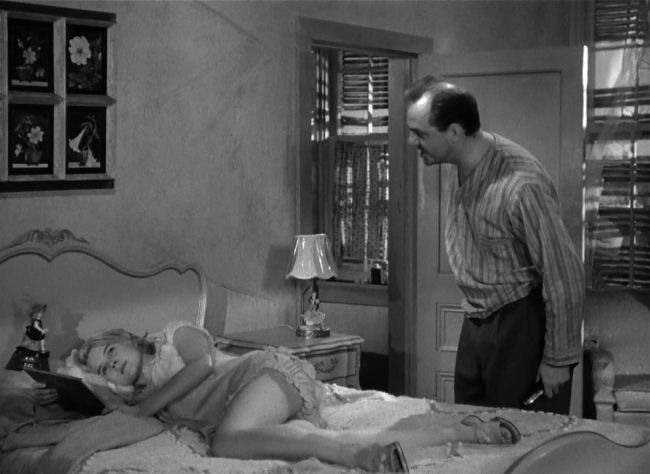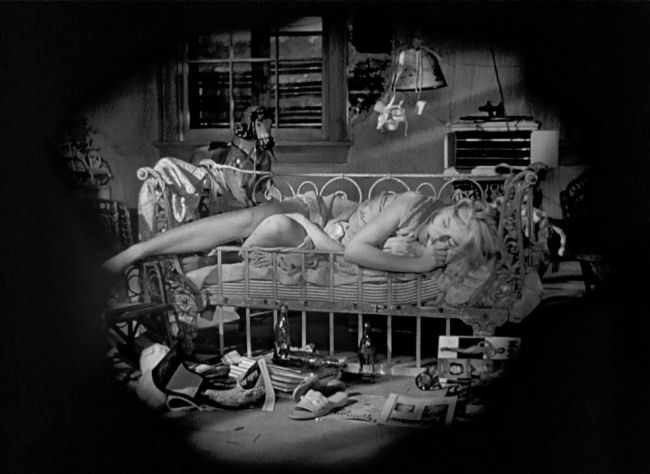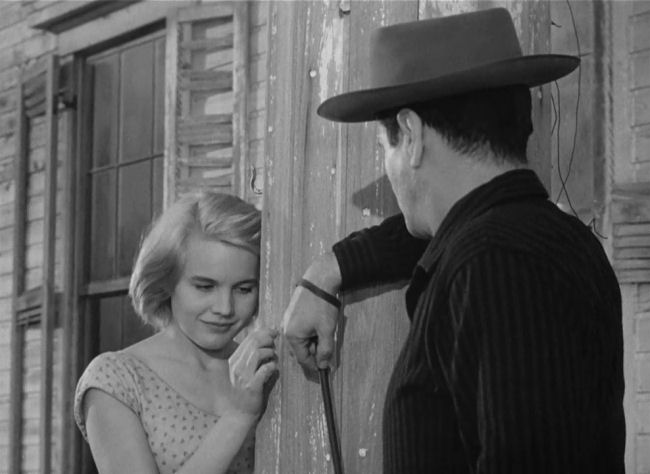
Institutions of liberation and oppression are sometimes influenced by race, sex, or arson. Elia Kazan's 1956 film Baby Doll links all three in a story about instinct in conflict with injustice. Based on Tennessee Williams' one act play 27 Wagons Full of Cotton, with a screenplay by Williams, it's not the best work of either the screenwriter or the director but has a fascinating sensuality and strange, cold chemistry between its three leads.

Karl Malden plays Archie Lee, owner of a cotton gin in rural Mississippi. His young wife, known in the film only as "Baby Doll" (Carroll Baker), is just about to turn twenty, at which point she and Archie will finally have sex. Archie acquired Baby Doll rather like property as part of a deal with her father. Because she wasn't ready for certain aspects of marriage, the parties agreed things wouldn't get physical until Baby Doll's twentieth birthday. Baby Doll's immaturity is broadly and repeatedly established--the first shot of her is in a crib sucking her thumb, being spied on by Archie, and she's wearing the babydoll nightgown the movie made famous.

She's prone to teasing her frustrated husband, giggling and scampering about like a child and then suddenly exhibiting anger. And yet, the young woman is clearly not content with the situation, threatening that she'll go to town and get her own job. An impromptu interview with a dentist for a receptionist job, though, reminds Baby Doll she's completely lacking in employable skills, her upbringing not exactly having prepared her for independence.

It's not just independence she wants--Archie's business is failing and almost all their furniture has been repossessed. Archie blames his woes on competition from a newcomer, a Sicilian immigrant named Silva Vacarro played by the great Eli Wallach who passed away just last week.

When Silva's massively successful cotton gin burns down, he learns quickly he can expect no justice from the local white law enforcement. Figuring it was Archie who burned his gin, Silva plays nice, offering a partnership with Archie and arranging to be alone with Baby Doll in her and Archie's crumbling antebellum house.

Most of the movie is these two in the house, his attempts to get a signed affidavit as a witness to her husband's crime manifest as attempts to physically seduce her while Baby Doll finds herself fighting sexual urges for perhaps the first time in her life.

I've heard it said the Eli Wallach was not appropriate casting. The role might have been more successfully played by Marlon Brando--I'd almost bet that's who Kazan originally had in mind for the role. Wallach was also a method actor so perhaps the filmmakers thought he would be an appropriate substitute. But Wallach didn't have Brando's vulnerability, he's almost all output in this film, all calculation though one senses some mixed emotions in how to deal with Baby Doll.

He's actually not that different from Malden--they even have kind of the same big, cleft nose. The impression is that Baby Doll might be trading one materialistic patriarch for another yet at least she's clearly attracted to Silva.

The scene that got the movie banned in so many places and drew such backlash from the Catholic church is one in which she and Wallach sit close together on a swing. The camera is so close and Baker's performance is so effective one does have the impression that Baby Doll is becoming sexually excited in spite of herself though her lines are only about how she's feeling ticklish and weak.
Those who criticised the film on a moral level claimed that Wallach's hand was up Baker's dress off-screen. I think this is a good example of the subjectivity of censorship and the sexual clumsiness of the censors--I'm reminded of the student in the sexual education class in Monty Python's Meaning of Life who suggested foreplay involved going straight for the clitoris. The scene is much sexier for how little is happening, just Silva's face close to hers. When she says she wants to stand up, he lets her, at which point she clearly does so with reluctance.


No comments:
Post a Comment